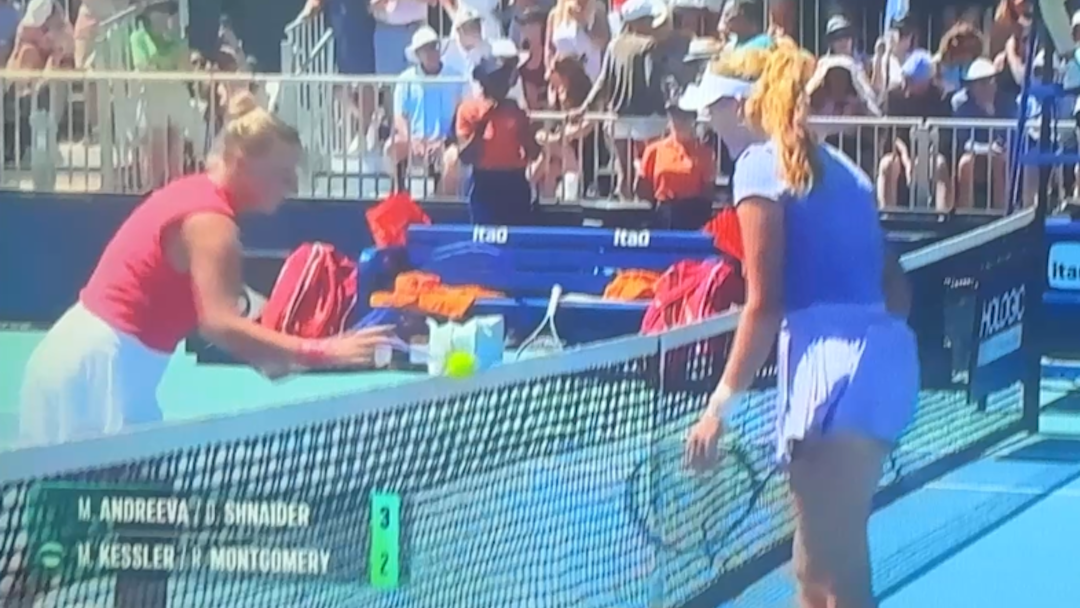Fiend at Court Unplugged
In order to categorize something as good or bad, there must be some overarching mechanism for making that determination. In the Declaration of Independence it was phrased as “We hold these truths to be self-evident…” Other people might call it a “moral compass.” As an engineer, I prefer the bland description “decision framework.”
Whatever you call it, there is a foundational philosophy that encapsulates the criteria used to separate right from wrong. There is a currently a raging debate within the USTA Texas Section over points allocated and awarded at a recent closed Level 4 tournament. Understanding the player frustration requires a conceptual understanding of a fundamental truth that most experienced tournament players hold to be self-evident: The draw format of a tournament should not materially alter the rankings point allocation for the players.
The fact that this post exists is because that foundational philosophy was violated in the 2021 USTA Tournament Rankings Points Tables. It comes at a time when there are still significant issues with the USTA tournament and ranking system software. There is also general player angst over how the consolidation of USTA adult tournaments to a single national framework has impacted the vibrant tennis tournament playing community in Texas. Emotions are running high.
In 2021, the USTA rolled out a national consolidated tournament structure and a new digital platform with flaws that have yet to be fully resolved. This year will be forever remembered as a comedy of errors, cascading side effects, and unintended consequences. With so much to break down, this is most certainly not a “one and done” treatment of this topic on this site. A summary of upcoming related posts is at the end of this article.
At the core of this series is a fundamental truth that I personally hold to be self-evident: In order to solve a problem, you have to first fully understand the root cause of the problem. My motivations in putting these posts out are to help all the stakeholders drive to an equitable and fair solution.
The USTA Texas Masters
To understand the drama playing out in the USTA Texas adult tournament community right now, you first have to understand the Texas Masters. To describe the tournament as a closed USTA “Level 4” tournament is inadequate. I previously conveyed a little of the spirit in “Tennis Tournaments: The Masters Motivation.”
The Texas Masters is very similar to the ATP and WTA tour finals from the standpoint that only the top 8 ranked players who enter are selected. Getting into the Masters is an achievement. Winning the Masters is a notch above winning the Sectional Championship. It is an inherent part of the tournament culture in Texas.
The draw format used for the Texas Masters divides the players into two Round Robin groups. The winner of each group advance to play head to head for the title. That format is one of the thing that makes the Masters so great. Each player is guaranteed three matches against some of the other top players in the section.
Unfortunately, the traditional draw format used in the Masters is not explicitly covered in the 2021 USTA Adult Tournaments Ranking System points tables. Additionally, there is a flaw in two of the Round Robin point allocation tables in that document.
The USTA Adult Tournament Point Tables
The fact that I missed the issue with the Round Robin format in the USTA Adult Ranking Point Table, is a minor personal embarrassment. If you pop “USTA Ranking” into the search box on this site, you will find a full four pages of posts related to that topic.
When the USTA originally published the preliminary rankings table for public review and comment, I performed a critical review. I did not return any comments to the USTA at the time because I didn’t see any issue with the tables. In retrospect, my bad.
When the current controversy erupted over the Masters point allocations and before I reviewed the existing Round Robin points schedules, I expected to find that the Round Robin point schedules were added after that original public comment period. I was surprised to discover that the offending tables have been in there all along.
Part of my personal journey this week was trying to figure out how I missed it. There are actually three tables for the Round Robin format in the USTA Adult Tournament Rankings System. The first table is for a single group Round Robin tournament. There are no issues with that table. The problems are with the subsequent two tables that have preliminary Round Robin groups that feed into a Single Elimination tournament bracket.
My pre-publication review of the points tables was primarily focused on whether the allocation of points for the various levels of the tournament was fair and equitable. I completely missed the ambiguity of how the traditional format of the Texas Masters would be handled in the new system. I also failed to notice the issue with the two Preliminary Round Robin Tables. I am chalking that up to the fact that I didn’t anticipate that format would ever be particularly relevant. Again, my bad.
The point I want to underscore is that making sweeping changes of this nature is much, much harder than it looks.
Illustrating the Problem
To illustrate the fundamental problem with the defined points tables, the Texas Masters is the perfect case study. For traditional draw formats in a Level 4 tournament, the Champion receives 1500 points. However, if the bracket was played as a “Tournaments With Round Robin Preliminary Rounds & SE Draw of 4 Playoff” the points change. A lot.
According to the most applicable points table for that draw format, the Champion receives 576 points for winning the finals and 116 points per round for winning each preliminary Round Robin match. A Champion that went 3-0 in their preliminary group would receive a grand total of 924 points plus 15 participation points. That is what is in the published standard.
To further illustrate the problem, there were brackets at the Masters that didn’t fill up this year. Some divisions were played as a single Round Robin group. In that case, the applicable points table is the “Points Per Round, Round Robin (no playoff).” In that table, the Champion receives the full 1500 points.
It is a violation of the fundamental truth held to be self-evident: The draw format of a tournament should not materially alter the rankings point allocation for the players.
In an nutshell, that is what the tournament players in Texas are upset about.
As an editorial note, in the interim the USTA decided that the winners of each division would receive the full allocation of 1500 points. That decision is contradictory to what is in the published points schedules of the USTA. Additionally, no adjustments were made for the other players in the brackets. This creates an inconsistent position for the USTA. We are sliding down the slippery slope.
The Solution and the Virtue of Patience
There are two challenges facing the USTA Adult Competition Committee and USTA Texas. One is how to fix the issue in the long term, and the other is what to do about the current situation.
The long term solution is to fix the discrepancies in the point tables to be consistent with the fundamental truth that the draw format of a tournament should not materially alter the rankings point allocation for the players. Paradoxically the easiest way to do that is to simplify the point tables to focus on the Order of Finish in a tournament rather than the draw format used. It will eliminate some tables. Hopefully the USTA is moving in that direction for 2022.
Fixing the points situation for the current year is very complex. Changing how the points are allocated for Round Robin tournaments impacts not just the Texas Masters, but a lot of tournaments that were held in other sections. Publishing a new point schedule and making it retroactively apply to tournaments conducted earlier in the year is a monumental decision that cannot be made lightly.
Each tournament player in Texas needs to be patient while the USTA sorts through the complexities of how to address the current situation. We need to focus on the big picture rather than individual data points because no matter what decision is made… someone is going to be unhappy.
As of right now, here is my rough plan of upcoming posts. The logical continuations of this post are a part of the “Unplugged” posts that are bolded.
| Saturday 11/13 | Unplugged | Texas Understood the Assignment: Rankings Points Matter |
| Sunday 11/14 | Unplugged | The Fix is In: Repairing the USTA Tournament Points Allocation Tables |
| Monday 11/15 | Tennis News | Curated news articles from the world of tennis. |
| Tuesday 11/16 | Tennis Tech and Training | Analytics from the Billie Jean King Cup |
| Wednesday 11/17 | The Rules of Tennis | Tiebreak Rules from the #NextGenATP Finals |
| Thursday 11/18 | Tennis Hits the Books | The Road to Wimbledon by Alice Marble |
| Friday 11/19 | Unplugged | The Importance of Tournaments within the Tennis Ecosystem |
| Saturday 11/20 | Unplugged | Player Experience, Transparency, and Communication |
| Sunday 11/21 | Unplugged | The USTA Adult Competition Committee |
- 2021 USTA Adult Tournaments Ranking System, USTA Web Hosted Document, viewed 11/11/2021.




If only there were a “submit a suggestion button” on USTA’s website, so that all of us can recommend that we have an actual tennis player(s) in each state, represent our community in one of their meetings. When they have meetings that decide our future and our tournaments. Ohhhh that would be ever so AMAZING. If we could have someone actually step up and fight for us and not actually be accepting of what’s obvious,…. is wrong, and then to relay it in a manner that talks down to us,….. oh yeah, they wouldn’t like it if we had someone on their board/committee sharing all of their mistakes. This would be awesome. A sense of accountability and sharing their power. I’m pretty sure this is why they DON’T have a suggestion button or box or email. Lmao.
Who holds them accountable?
Anyway,.. one can dream!
Excellent, well-reasoned piece on an important topic. I look forward to the follow-up posts and hope that USTA decision-makers at the state and national level are also reading this.
Very well written. I look forward to reading your upcoming posts.